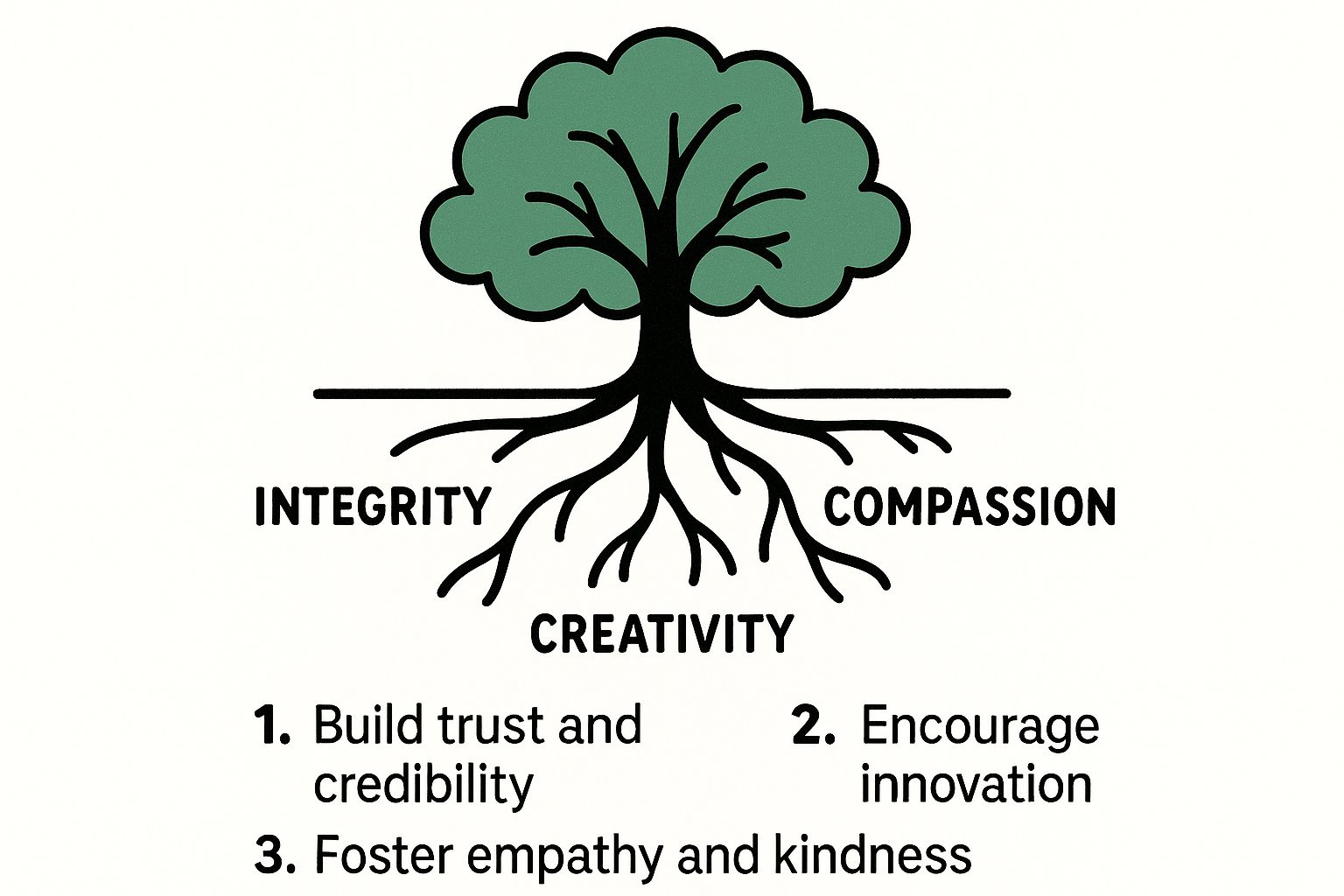What Purpose Really Means in Today's World

So much talk about "finding your purpose" feels vague and idealistic. But what does purpose truly mean in our daily lives? It’s bigger than a career, hobby, or even a passion. Purpose is a deep sense of meaning and direction. It’s about aligning your actions with your values and contributing to something beyond yourself. This alignment builds resilience, helping you face life's inevitable difficulties.
This view of purpose goes beyond traditional ideas that often link it only to professional success. Your career can be part of your purpose, but it doesn't have to be the whole story. You might find deep purpose in raising a family, serving your community, or exploring a creative passion, even if it's not your main job. Purpose is also different from temporary passions; it's a steadier, more lasting source of motivation.
Purpose in the Age of Agency
Discovering your purpose is increasingly tied to personal independence and self-reliance. We're living in the "Age of Agency," where individuals are taking charge of their lives and shaping their own futures, especially in uncertain times. Over 72% of people worldwide feel positive about their personal lives, focusing on values like self-reliance, freedom, health, and personal growth—all vital to a purpose-driven life. This shift highlights the importance of connecting personal goals with a larger life purpose, particularly as the world changes. Discover more insights about the Age of Agency.
Debunking Myths About Purpose
Some common myths make finding our purpose harder. One myth is that purpose is a single, grand destination. But purpose is often a journey of constant growth, changing as we evolve and our situations shift. Another myth is that finding your purpose will magically solve all your problems. Purpose is a guide, not a quick fix; it gives you direction but still takes effort and navigation.
Purpose Across Life Stages
What gives you a sense of meaning at 20 might not be the same at 50. This is natural; it reflects personal development and shifting priorities. Accepting this and letting your purpose evolve is key to a fulfilling life. This understanding helps you adapt and find new meaning as you go through different experiences and face new challenges.
Recognizing When You're Off Your Purpose Path
The subtle yet profound signals that you haven't found your purpose can deeply affect your life. These signs can range from Sunday night dread to a surprising emptiness after achieving a milestone that should feel fulfilling. Recognizing these indicators is the first step toward real change and the awareness needed to discover your purpose.
Identifying Purpose Misalignment
Sometimes, the most telling sign that you're not living your purpose is a persistent feeling of unease. This could manifest in several ways:
- Decision Paralysis: Struggling with decisions, even small ones, because you feel disconnected from your values.
- Constant Comparison: Endlessly comparing yourself to others, leading to feelings of inadequacy.
- Restlessness: A nagging sense of restlessness, even when you're outwardly successful.
These feelings act as a compass, pointing you toward a deeper need for alignment with your true self.

The infographic above visualizes how a strong sense of purpose is rooted in core values like integrity, creativity, and compassion. Like a tree needs strong roots to thrive, our purpose needs to be grounded in values to truly flourish. When these roots are weak, we experience the misalignment discussed earlier.
To illustrate the difference between living in and out of alignment with your purpose, let’s look at a comparison:
This table highlights the key differences between living with and without purpose alignment:
| Signs of Purpose Misalignment | Signs of Purpose Alignment |
|---|---|
| Feeling lost and directionless | Feeling a sense of direction and clarity |
| Lack of motivation and enthusiasm | Feeling motivated and inspired |
| Experiencing frequent negative emotions like anxiety and frustration | Experiencing positive emotions like joy and fulfillment |
| Difficulty making decisions | Making decisions with confidence and ease |
| Feeling disconnected from yourself and others | Feeling connected to yourself and others |
| Struggling to find meaning in your life | Finding meaning and purpose in your work and personal life |
| Feeling like you're not living up to your potential | Feeling like you're living your best life |
This comparison reveals the clear differences between living with and without purpose alignment. Embracing the indicators of alignment can lead to a more fulfilling and meaningful life.
Recognizing the Subtle Signs
Other, more subtle signs can also indicate you’re off your purpose path. Imagine achieving a long-sought goal, only to feel a hollow sense of "is this all there is?" Perhaps you find yourself going through the motions, lacking genuine enthusiasm for your daily activities. This can even manifest as a decreased sense of connection with others, leaving you feeling isolated. These seemingly small indicators are often whispers from your inner self, urging you to seek deeper meaning.
The Importance of Self-Reflection
Recognizing these signs is crucial for discovering your purpose. This self-awareness allows you to ask deeper questions about what truly matters to you. Acknowledging that you're not on the right path is not a sign of failure; rather, it’s the catalyst for positive change. Identifying these feelings of misalignment is a crucial step toward finding fulfillment and living authentically.
Transformative Exercises That Reveal Your Purpose

Now that we’ve explored the signs of purpose misalignment, let's shift from theory to practical application. Discovering your purpose requires both deep introspection and active exploration. These exercises offer a tangible path towards uncovering your true motivations. They aren't quick solutions, but rather transformative practices that yield profound insights with dedicated effort.
Peak Experiences Inventory
The Peak Experiences Inventory is a potent exercise designed to identify recurring themes in your most fulfilling moments. Think of it as charting a map of your happiest memories to uncover underlying patterns.
To begin this exercise:
-
List Your Peak Experiences: Recall times when you felt truly alive, deeply engaged, and profoundly satisfied. These could range from significant professional achievements to quiet moments of reflection in nature.
-
Analyze the Common Threads: What skills were you utilizing? Which values were being honored? Who were you sharing the experience with? What personal needs were being met?
-
Identify Patterns: Look for recurring themes in these experiences. These consistent elements often offer valuable clues to your core values and the activities that bring you the most significant meaning.
For example, if a significant number of your peak experiences involve helping others, it suggests that contributing to something greater than yourself is a central component of your purpose.
Values Clarification Process
Our values are frequently obscured by societal expectations and external pressures. The Values Clarification Process helps to filter out this external noise and uncover your authentic priorities.
This exercise involves:
-
Brainstorming Your Values: Create a comprehensive list of all the values that resonate with you, ranging from creativity and kindness to security and independence.
-
Prioritizing Your Top Values: Refine your initial list to your top five core values. This focused approach helps you hone in on what truly matters most.
-
Reflect on Your Actions: How well do your current actions align with these prioritized values? Where do you see discrepancies? Understanding these misalignments can illuminate areas where you may be deviating from living your purpose.
Additionally, consider how your values might shift and evolve as you grow and navigate new life stages. This flexibility allows your sense of purpose to adapt and grow alongside you.
The Ikigai Framework
The Japanese concept of Ikigai, often translated as "a reason for being," provides a powerful framework for uncovering your purpose. Ikigai lies at the intersection of four crucial elements:
- What you love (your passion)
- What you're good at (your talent)
- What the world needs (your mission)
- What you can be paid for (your vocation)
Finding the sweet spot where these four areas converge is key to discovering your ikigai. This framework encourages you to consider not just your internal desires and skills, but also your contribution to the world and your ability to build a sustainable life. For instance, you might be passionate about art and talented at painting, but if the market for your artwork is limited, building a sustainable livelihood around it could be challenging. The ikigai framework prompts you to consider how to integrate your passions and talents with a viable vocation and a meaningful contribution to society.
Interpreting Your Results
These exercises are intended to guide you, not define you. As you analyze your results, approach yourself with compassion and embrace the ongoing nature of self-discovery. Your purpose is not a fixed destination, but a continuous journey of exploration and growth. These exercises provide a solid foundation for understanding your purpose and how it can shape your life.
Bringing Purpose Into Your Everyday Reality
Discovering your purpose is a profound and deeply personal achievement. But the true magic happens when you weave that purpose into the fabric of your daily life. This section explores how to bridge the gap between understanding your purpose and truly living it, aligning your everyday choices with the direction you’ve discovered.
Integrating Purpose Into Your Career
For many of us, our sense of purpose is deeply connected to our careers. This doesn't always require a dramatic career change. If a new career path aligns with your discovered purpose, it's often wise to approach it strategically. Instead of making impulsive leaps, consider taking incremental steps. Perhaps you could dedicate your free time to developing new skills, networking within your target field, or exploring a side hustle that resonates with your purpose. This measured approach allows you to gain valuable experience and build a solid foundation before making major financial commitments.
What if changing jobs isn't feasible right now? You can still infuse purpose into your current role. Seek out projects that align with your values, mentor colleagues, or volunteer for initiatives that resonate with your core purpose. Even small adjustments can have a profound impact on your overall sense of fulfillment and job satisfaction. To kickstart your purpose discovery, consider using a personal development SWOT analysis for structured self-reflection and personal growth.
Purpose Beyond the Workplace
Purpose isn't confined to the office walls; it extends far beyond your professional life. It influences your relationships, community involvement, and how you choose to spend your precious free time. Reflect on how your purpose can be expressed through your family interactions, friendships, and contributions to your community. Perhaps your purpose lies in fostering creativity in your children, supporting friends through difficult times, or volunteering for a cause that’s close to your heart. These actions weave purpose into the tapestry of your life, creating a ripple effect of positive change.
Overcoming Common Roadblocks
The path toward a purpose-driven life isn't always a smooth one. Common obstacles such as financial constraints, geographic limitations, or even resistance from loved ones can present significant challenges. For instance, financial limitations might make a career change seem out of reach. However, resourceful solutions such as online courses, mentorship programs, or building a portfolio through volunteer work can help you make progress without significant upfront costs. Similarly, geographic limitations can be overcome through remote work opportunities, online communities, or by connecting with like-minded individuals in your local area. Addressing these challenges head-on empowers you to live your purpose, no matter the external circumstances.
While the global economic and employment landscape remains complex in 2025, with projected global growth of 3.2% and an unemployment rate of 4.9%, the desire for purpose is being shaped by larger societal changes. The impact of the COVID-19 pandemic, geopolitical tensions, and climate emergencies have accelerated shifts in global labor markets. This means that individuals are increasingly seeking purposeful careers that address these global challenges, contributing to a more sustainable and equitable future. Find more detailed statistics here.
Navigating resistance from loved ones requires open communication and empathy. Clearly explaining your purpose, demonstrating its positive impact on your well-being, and patiently addressing their concerns can help them understand and support your journey. These conversations can even strengthen your relationships while allowing you to stay true to yourself and your purpose. Bringing purpose into your everyday reality is a conscious choice, a commitment to aligning your actions with your deepest values. By doing so, you transform your daily life into a vibrant expression of your authentic self.
Digital Tools That Accelerate Your Purpose Journey
Finding your purpose is a deeply personal journey. In our connected world, technology can either help or hinder that process. This section explores how to use digital tools effectively to accelerate your self-discovery, without getting lost in the digital noise. It's about focusing on tools that foster introspection, not distraction.
AI-Powered Assessments and Digital Journaling
AI-powered assessment platforms, like Crystal Knows, can act as a digital compass. They analyze your preferences, strengths, and values, identifying patterns you might not see on your own. These platforms often use algorithms to process your responses to questionnaires and exercises, revealing hidden insights about your potential path.
Digital journaling is another invaluable tool. Regularly documenting your thoughts and feelings creates a personal record of your inner world. Over time, this reveals recurring themes and emotional responses, giving you a richer understanding of what truly matters to you. Some platforms even incorporate AI-driven analysis to deepen those insights.
Online Communities and Support Networks
While self-discovery is a personal endeavor, you don't have to go it alone. Online communities can offer a sense of connection and shared experience. They provide a space to connect with others on similar journeys, offering encouragement and support during challenging times. These digital networks become invaluable in fostering motivation and creating a safe space for vulnerability.
Navigating Digital Pitfalls
Digital tools have their downsides. The constant comparison on social media can lead to feelings of inadequacy, while the never-ending stream of information can scatter your focus. It's crucial to set boundaries. Limiting social media, scheduling reflection time, or using productivity apps can help you manage your digital intake. Mindful engagement is key.
Leveraging Technology for Purpose
The link between purpose and technology goes beyond individual self-discovery. It also applies to how organizations use technology to achieve their goals. For example, in the life sciences field, a growing number of leaders are using technology to enhance innovation and agility. 69% of tech executives plan to invest in upskilling for skills related to subjects such as artificial intelligence (AI), highlighting the growing importance of digital fluency. This shows how technology can enable individuals and organizations to pursue their purposes more effectively. Explore this trend further here.
To better understand the range of tools available, let's look at the following table:
Digital Purpose Discovery Toolkit
A comprehensive evaluation of technologies that support different aspects of purpose discovery
| Technology Type | Specific Tools | Best Used For | Limitations |
|---|---|---|---|
| AI-Powered Assessments | Crystal Knows, Pymetrics | Identifying strengths, values, and potential career paths | May oversimplify complex personal attributes; requires critical thinking about results |
| Digital Journaling | Day One, Penzu | Self-reflection, tracking emotional responses, identifying recurring themes | Requires consistent effort; data privacy concerns |
| Online Communities | Reddit, Facebook groups | Connecting with like-minded individuals, finding support and encouragement | Potential for misinformation; requires discernment when choosing communities |
| Productivity Apps | Forest, Freedom | Minimizing distractions, managing time for self-reflection | Requires discipline to use effectively; may not address underlying issues with focus |
This table highlights the diverse range of digital tools available, along with their strengths and limitations. It’s important to choose the tools that resonate with you and use them intentionally.
By using digital tools strategically, you can gain clarity, connect with others, and create space for meaningful self-discovery. Technology can be a powerful ally on your purpose journey, helping you build a more fulfilling life aligned with your authentic self. Remember, technology should support, not replace, the essential inner work of finding your purpose.
Evolving Your Purpose Through Life Transitions
Life is a river, always in motion, always changing. Your purpose isn't a fixed point, but a journey that unfolds with you. It evolves as you navigate life's transitions, whether they're planned milestones like graduating college or unexpected detours like a sudden career change. This exploration focuses on nurturing your core purpose during significant shifts, seeing these changes not as roadblocks but as gateways to growth.
Reassessing Your Purpose During Pivotal Moments
Major life transitions—career changes, shifts in relationships, health adjustments, children leaving home, or retirement—often invite us to re-evaluate our purpose. This isn't about abandoning your core values. It's about refining how those values take shape in your new circumstances. For instance, a career change might spark a new creative venture, allowing you to express yourself in unexpected ways. Retirement might free up time for community involvement, reflecting a continued commitment to giving back.
These pivotal moments offer valuable opportunities for reflection. Ask yourself: What truly resonates with me now? How can my actions align with my values in this new chapter? This inner dialogue helps refine your purpose, keeping it vibrant and fulfilling.
Processing Grief and Embracing New Meaning
Transitions, even positive ones, can involve grief. Letting go of familiar roles or aspects of your identity can be difficult. Acknowledging this grief is a crucial step forward. Allow yourself to process the emotions tied to change, giving yourself time to adjust to the new reality. This emotional processing opens the door to discovering new sources of meaning and fulfillment that align with your evolving purpose. Embracing the new begins with honoring the old.
Discovering New Sources of Meaning
When one door closes, another opens. Life transitions create space for exploring different facets of yourself and uncovering new passions. This might involve pursuing a new hobby, volunteering for a cause close to your heart, or strengthening bonds with loved ones. Each new experience adds depth and richness to your sense of purpose.
Viewing Transitions as Opportunities for Growth
Rather than fearing change, view transitions as chances to connect more deeply with your authentic self. Each transition is a chance to learn, grow, and refine your purpose. It's like tending a garden—pruning back old growth creates space for new blooms. To share your journey and connect with others, consider using blogging tools. By embracing change, you can continually refine your purpose and live a life that reflects your evolving values and aspirations. This proactive approach empowers you to not just survive transitions, but to thrive in them, constantly evolving and discovering new dimensions of your purpose.
Building a Sustainable Purpose-Driven Life
Discovering your purpose is a remarkable achievement, but it's only the first step. The true journey lies in weaving that purpose into the fabric of your everyday life and nurturing it for the long haul. This involves cultivating daily practices, shaping your environment, and fostering a supportive community. Imagine tending a garden: consistent care is essential for it to thrive.
Reinforcing Purpose Through Daily Routines
Integrating purpose into your daily life doesn't necessitate drastic changes. Small, consistent actions can have a profound impact. Consider dedicating a few minutes each morning to journaling about your aspirations. Engage in activities that resonate with your values, or connect with people who inspire you. These seemingly small steps create a ripple effect, strengthening your sense of purpose.
Navigating Purpose Fatigue
Even with the deepest sense of purpose, motivation can wane. Purpose fatigue is a natural part of the journey. Anticipate these lulls and develop strategies to navigate them. This could involve taking breaks to recharge, revisiting your initial "why," adjusting your approach, or leaning on your support network. Purpose is a marathon, not a sprint.
Measuring Fulfillment Beyond Conventional Metrics
Societal markers of success, such as wealth or status, don't always align with a purpose-driven life. It's essential to define your own metrics of fulfillment. This might involve tracking progress toward personal goals, assessing how frequently you utilize your unique talents, or reflecting on the positive impact you have on others. Defining your personal measures of success creates a compass guiding you toward genuine fulfillment.
Course Correction and Evolution
Life is full of unexpected turns. Your sense of purpose isn't fixed; it evolves as you grow and change. Embrace this evolution and remain open to course correction. Regularly evaluate your path, asking yourself if your actions still align with your values and aspirations. This continuous self-assessment allows your purpose to adapt, ensuring it remains a vibrant force throughout your life. This harmony of consistent practice and adaptability is key to building a sustainable purpose-driven life. It allows you to stay true to your core values while navigating life's inevitable changes. By embracing these practices, you can create a life that not only reflects your purpose but actively embodies it.
Ready to define your purpose and cultivate a personal brand that truly resonates? Visit Henri Den to embark on your journey today.






